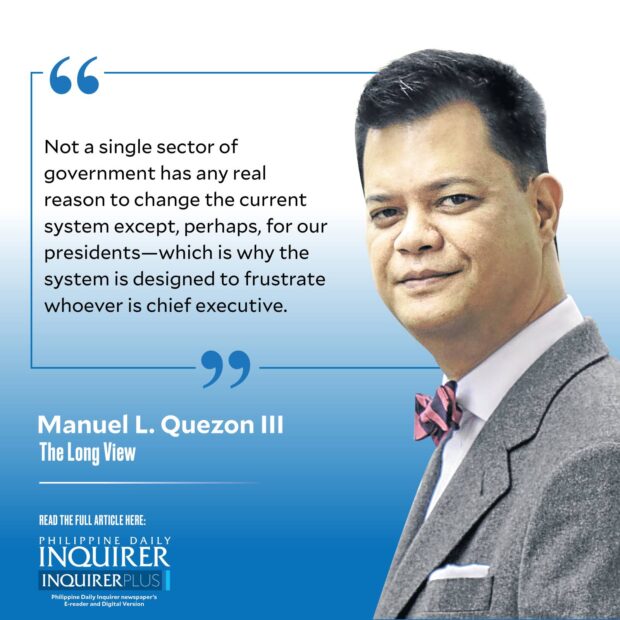Government by opinion (3)

Sen. Imee Marcos, who has that smart person’s gift—the ability to give reporters a cutting phrase on demand—dismissed the latest gambit by the House of Representatives to amend the Constitution by describing it as the kind of scheme proposed by only those unelectable to the presidency.
Her withering contempt was aimed at her first cousin, Speaker Martin Romualdez, who seems to enjoy a closer relationship, politically and personally, with her brother, President Marcos, than she does. She is, of course, a reelectionist whose political value needs to be validated by a return to the Senate, where she will both outlast her brother’s presidency and be of use to the ally she holds closer, the current Vice President. After all, just as Inday Sara can still dream of the presidency, Ate Imee can still dream of being veep.
This year is the calm before the storm in the sense that 2025, as the Philippine Center for Investigative Journalism has pointed out, will feature not just the midterms but a total of three elections: two will take place in May: the national midterm elections and the first regular election in the Bangsamoro. The two elections being joined at the hip is a legacy of President Benigno S. Aquino III, who surprisingly convinced the political class to synchronize the two to forever prevent a return to the era of “dagdag-bawas.” Then, in December 2025, the barangay and Sangguniang Kabataan elections will be held, perhaps a convenient time for a constitutional plebiscite.
I have become convinced that much as the well-meaning and the simply irredeemably nerdy have long argued over what constitutional changes should be made, the reality of widespread public ignorance of the Constitution’s actual provisions and the despair of the constitutionally concerned (or obsessed) disguises an even more basic fact. And that is: not a single sector of government has any real reason to change the current system except, perhaps, for our presidents—which is why the system is designed to frustrate whoever is chief executive.
To be sure, the first problem has been one of authorship. The authors of our Constitution did an outstanding job in (accidentally, to be sure) coming up with a Charter impossible to amend. And what cannot be amended cannot be improved. For those sincerely alarmed by our having an operating system stuck in the Casio calculator era, convincing the public to care has proven impossible as public education has degraded and our civic sense has withered away.
For those motivated by political self-interest, it’s also proven a tall order as they refuse to run the (only public-acceptable) risk of an elected convention, and cannot think of changes that wouldn’t deprive the electorate of one of the few rights it cherishes—that of individually casting a vote for the head of state and government. You can try to make sense of the endless permutations of the endlessly failed efforts to change the Constitution, but I suspect that in the end, you will reach the conclusion that even among the proponents, there has never been a critical mass in favor of amending, much less changing, the system.
Local governments run the risk of their powers, both fiscal and political, being clipped. Senators fear being amended out of existence, and House representatives—who constitute a permanent majority able to extort funds and favors from whoever is elected president—run the risk of actually having to work or compete, or both. Even the Supreme Court and lawyers who enjoy the currently cozy system of selecting justices, with a high court enjoying greater powers than its predecessors, run the risk of their powers and discretion being rolled back, or even worse, a constitutional court being created. Far better to do what they have collectively done: humor presidents and speakers and cause a lot of largesse to be pointlessly handed out, to no avail.
President Fidel V. Ramos in retrospect was the last of our old-fashioned presidents, one devoted to what can be described as the Cult of the State: one of those who explored aggrandizing their power as it ultimately would enhance that of their office, which they and others viewed as the lynchpin of the state. This viewed both power and office as essential to achieving modernity.
Marcos, I’ve always argued, was fundamentally anti-modern, even pre-modern, even as he mastered the appearances of modernity by parroting the lingo of the technocrats on which he depends. But his ultimate ambition was a hereditary monarchy disguised as a presidency. I am less convinced his crown prince shares the same obsession. He has achieved political and social vindication by election on the traditional Filipino political principle that election provides absolution, and by being welcomed back into the ranks to which he always felt he belonged: that of the world’s ruling families.
All that remains is to ensure the security of the clan by achieving the resolution of his family’s legal problems on terms favorable to it. In other words, by being the one who upholds, and doesn’t subvert, much less disturbs or disrupts, the system. Which would explain his limited support for strictly economic-related provisions of the Constitution.